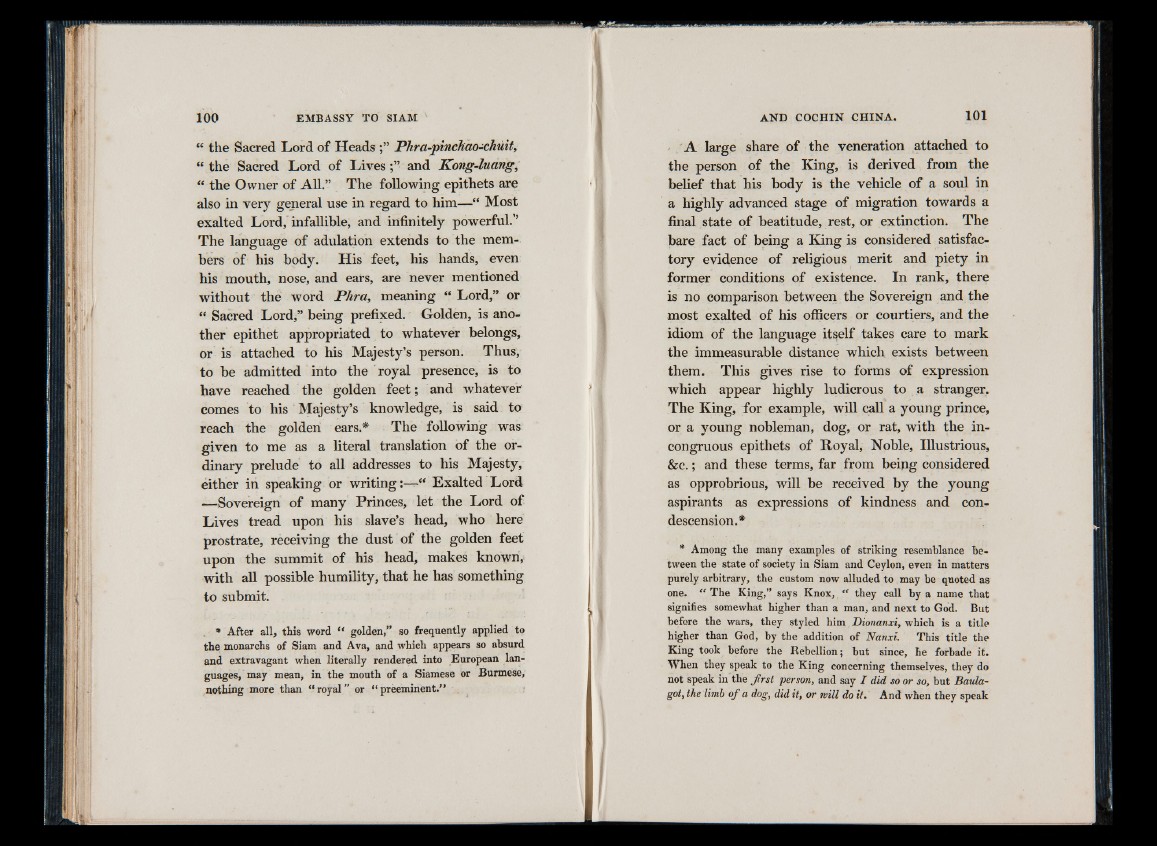
“ the Sacred Lord of H e a d s Phra-pinchao-ckuit,
“ the Sacred Lord of L i v e s a n d Kong-luang,
“ the Owner of All.” The following epithets are
also in very general use in regard to him—“ Most
exalted Lord, infallible, and infinitely powerful.’’
The language of adulation extends to the members
of his body. His feet, his hands, even
his mouth, nose, and ears, are never mentioned
without the word Phra, meaning “ Lord,” or
“ Sacred Lord,” being prefixed. Golden, is another
epithet appropriated to whatever belongs,
or is attached to his Majesty’s person. Thus,
to be admitted into the royal presence, is to
have reached the golden feet; and whatever
comes to his Majesty’s knowledge, is said to
reach the golden ears.* The following was
given to me as a literal translation of the ordinary
prelude to all addresses to his Majesty,
either in speaking or w r i t i n g E x a l t e d Lord
—Sovereign of many Princes, let the Lord of
Lives tread upon his slave’s head, who here
prostrate, receiving the dust of the golden feet
upon the summit of his head, makes known,
with all possible humility, that he has something
to submit.
, * After all, this word “ golden,” so frequently applied to
the monarchs of Siam and Ava, and which appears so absurd
and extravagant when literally rendered into European languages,
may mean, in the mouth of a Siamese or Burmese,
nothing more than “ royal" or “ preeminent.”
A large share of the veneration attached to
the person of the King, is derived from the
belief that his body is the vehicle of a soul in
a highly advanced stage of migration towards a
final state of beatitude, rest, or extinction. The
bare fact of being a King is considered satisfactory
evidence of religious merit and piety in
former conditions of existence. In rank, there
is no comparison between the Sovereign and the
most exalted of his officers or courtiers, and the
idiom of the language itself takes care to mark
the immeasurable distance which exists between
them. This gives rise to forms of expression
which appear highly ludicrous to a stranger,
The King, for example, will call a young prince,
or a young nobleman, dog, or rat, with the incongruous
epithets of Royal, Noble, Illustrious,
&c.; and these terms, far from being considered
as opprobrious, will be received by the young
aspirants as expressions of kindness and condescension.*
* Among the many examples of striking resemblance between
the state of society in Siam and Ceylon, even in matters
purely arbitrary, the custom now alluded to may be quoted as
one. “ The King,” says Knox, “ they call by a name that
signifies somewhat higher than a man, and next to Goid. But
before the wars, they styled him Dionanxi, which is a title
higher than God, by the addition of Nanxi. This title the
King took before the Rebellion; but since, he forbade it.
When they speak to the King concerning themselves, they do
not speak in the fir s t person, and say I did so or so, but Baula-
got, the limb o f a dog, did it, or mill do it. And when they speak